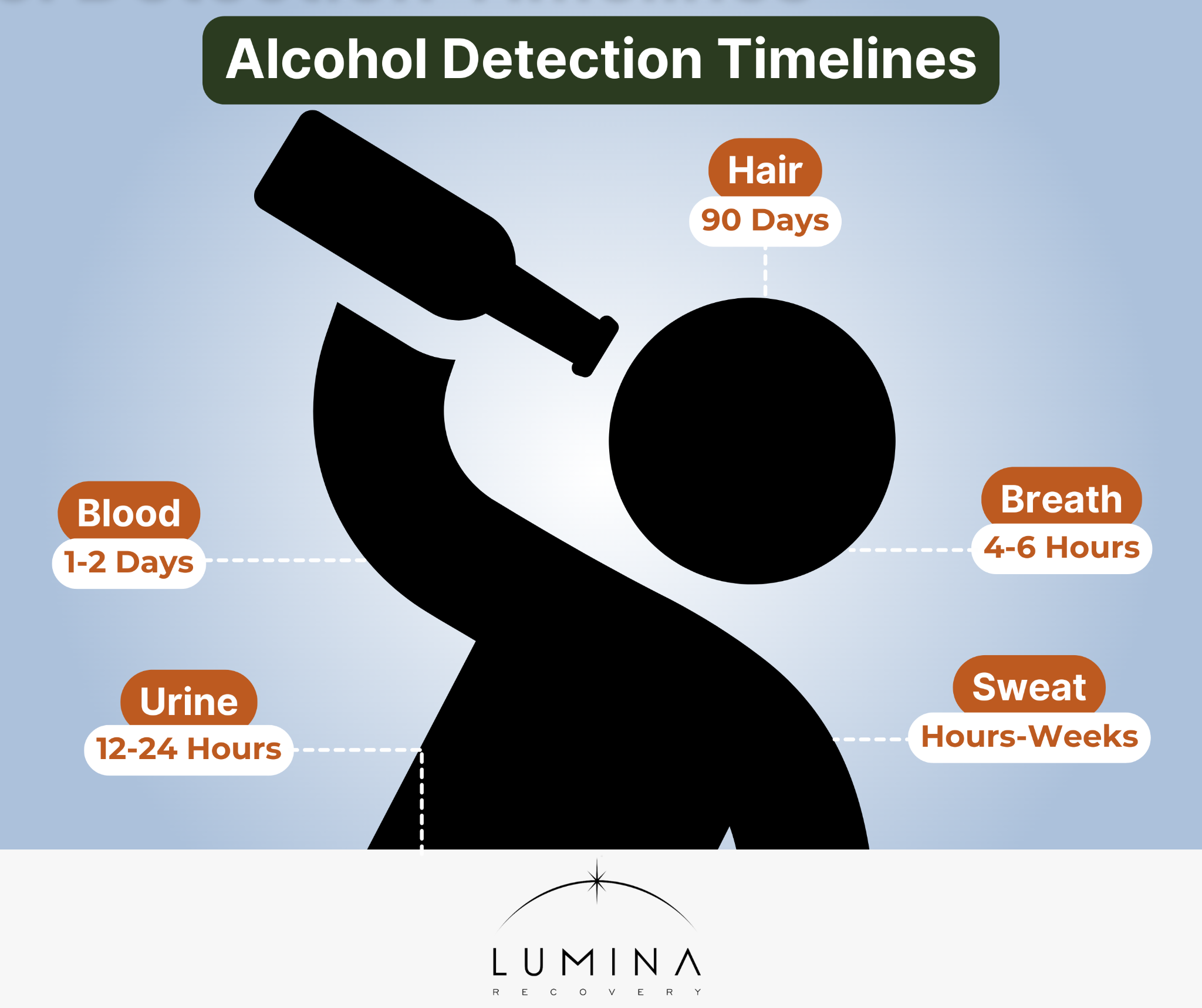The length of time alcohol stays in your system depends on several factors, including your metabolism, age, weight, gender, and how much you drink. On average, the body metabolizes alcohol at a rate of about one standard drink per hour.1 However, alcohol can still be detected in different ways for varying amounts of time.
A blood test may detect alcohol for 1 to 2 days, a breath test for 4 to 6 hours, and standard urine tests for 12 to 24 hours. In hair, alcohol can be detected for up to 90 days.1,2
These timelines can vary based on how your body processes alcohol, so the exact amount of time it stays in your system differs from person to person.
Factors Influencing Alcohol Metabolism
Alcohol metabolism varies from person to person due to biological and lifestyle factors. These elements play a role in how quickly the body processes alcohol and eliminates it.
Biological Factors
- Age: As people age, their metabolism slows, leading to longer alcohol retention.
- Gender: Women generally metabolize alcohol more slowly than men due to differences in body composition and enzyme levels.
- Body Composition: Individuals with higher body fat tend to retain alcohol longer since fat does not absorb alcohol.
- Genetics: Genetic variations influence enzyme activity responsible for processing alcohol.
Lifestyle Factors
- Diet and Eating Patterns: Consuming food before or during alcohol consumption slows its absorption into the bloodstream, especially in the small intestines.
- Physical Activity Levels: Regular exercise may contribute to a faster metabolism but does not significantly impact alcohol elimination.
- Overall Health Status: Liver function, hydration levels, and underlying medical conditions affect how long alcohol stays in your system.

Alcohol Detection Timelines
Different testing methods detect alcohol for varying durations. Here are the common detection windows:
- Blood Test: Alcohol remains detectable in the blood for 1 to 2 days.2
- Breath Test: Breathalyzers can detect alcohol for approximately 4 to 6 hours.1
- Urine Tests: Standard urine tests detect alcohol for 12 to 24 hours.1
- Sweat Testing: The detection window for alcohol in sweat is hours to weeks.2
- Hair Tests: Alcohol can be detected in hair follicles for up to 90 days.1
What Is Blood Alcohol Concentration (BAC)?
Blood alcohol concentration (BAC) is a measurement of the amount of alcohol present in the bloodstream. Having a BAC of 0.02% and above is considered unsafe and driving with a BAC of 0.08% or higher is illegal in the United States.1 High BAC levels may cause blacking out, which can be life-threatening.
BAC levels are influenced by several factors, including the quantity and rate of alcohol consumption, body weight and composition, and individual metabolic rates. Lighter individuals generally experience higher BAC levels with the same alcohol intake compared to heavier individuals.
A standard drink contains 14 grams (0.6 ounces) of pure alcohol, and consuming multiple drinks in a short time can cause BAC to rise rapidly.1 People with faster metabolisms process alcohol more quickly, leading to a faster decline in BAC.
Common Myths About Alcohol Metabolism
There are many misconceptions about how to speed up alcohol metabolism. Here are a couple myths about alcohol metabolism debunked:
- Myth: Drinking coffee accelerates sobriety.
Reality: Coffee may increase alertness but does not affect alcohol metabolism. The liver still metabolizes alcohol at the same rate, regardless of caffeine intake. While coffee can help a person feel more awake, it does not reduce BAC levels or eliminate alcohol from the body any faster.
- Myth: Physical activity can help “sweat out” alcohol.
Reality: Exercise does not significantly speed up alcohol elimination. While small amounts of alcohol may leave the body through sweat, the vast majority is processed by the liver. Engaging in physical activity may improve alertness and help with hangover symptoms, but it does not accelerate the breakdown of alcohol in the bloodstream.
Health Implications of Alcohol Consumption
Alcohol affects both short-term and long-term health.
Short-Term Effects
- Impaired judgment and coordination
- Increased risk of accidents and injuries
- Risk of alcohol poisoning, which can be life-threatening
Long-Term Effects
- Liver Disease: Chronic alcohol use can lead to cirrhosis and liver failure.
- Cardiovascular Issues: High alcohol intake increases the risk of high blood pressure and heart disease.
- Dependence and Addiction: Prolonged alcohol use may lead to addiction, requiring professional intervention.

When and How to Seek Help
If you or a loved one is experiencing any of these signs, it may be time to seek professional support. Early intervention can make a significant difference in recovery outcomes. Here’s how to take the next step:
- Consult a healthcare provider. A doctor or addiction specialist can assess the severity of alcohol use and recommend appropriate treatment options.
- Explore treatment programs. Options range from detox programs to outpatient and inpatient rehabilitation, depending on individual needs.
- Join a support group. Group therapy and support meetings provide peer support and guidance for individuals working toward sobriety.
- Consider therapy. Behavioral therapies like cognitive behavioral therapy (CBT) can help individuals address underlying triggers and develop healthier coping mechanisms.
FAQs
How long does alcohol stay in your blood?
Alcohol can be detected in your blood for 1 to 2 days.
Can drinking water or eating food speed up the elimination of alcohol from your system?
While hydration and food can slow alcohol absorption, they do not speed up its metabolism.
How does body weight and gender affect alcohol metabolism?
Women and individuals with lower body weight typically process alcohol more slowly, leading to higher BAC levels.
What are the risks of driving the day after heavy drinking?
Residual alcohol in your system can impair reaction time and judgment, increasing accident risk. It depends on the amount of time that has passed since drinking.
How accurate are home breathalyzer tests in measuring blood alcohol concentration?
Home breath tests provide an estimate but may not always be as accurate as professional-grade devices.
Take Control of Your Recovery Journey With Lumina Recovery
Understanding how long alcohol stays in your system and how tests can detect alcohol can help individuals make safer, more responsible decisions about drinking. It’s important to recognize when alcohol use is interfering with daily life, relationships, or health.
If you or someone you love is struggling with alcohol dependence, Lumina Recovery provides holistic alcohol treatment programs, including dual diagnosis treatment. Our evidence-based therapies and expert support help individuals break free from alcohol addiction and build a healthier, sober future.
Contact us today to start your journey to a healthier, alcohol-free life.
Sources:
- Heathline. How Long Does Alcohol Stay in Your Body?.
- McNeil SE, Chen RJ, Cogburn M. Drug Testing. [Updated 2023 Jul 29].


